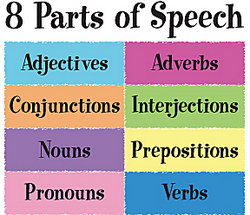
TIPS
TO HELP YOU RECOGNIZE PARTS OF SPEECH
NOUN The word is probably a noun if:
! You can make it plural or singular (one book, two books)
! You can make it possessive (book, book's pages; girl, girls' dresses)
! It can follow a prepositional phrase such as to the, with the,
from the.
! You can place the word a, an, or the
in front of it.
PRONOUN The word is probably a pronoun if:
! You can substitute the word for a noun
Examples: me, mine, you, he, her,
it, we, these, one, everybody (not a complete list)
ADJECTIVE The word is probably an adjective if:
! You can add er or est to the word
(happy--happier--happiest)
! You can use more or most in front of it (beautiful--more
beautiful--most beautiful)
! You can use the words very or quite in
front of it (she wore a very bright, daring costume)
VERB The word is probably a verb if:
! You can use will, shall, can, could, may, might, must, should,
or would in front of the word.
Examples: will come, could go,
would miss
ADVERB The word is probably an adverb if:
! There is an ly suffix (happily)
! The word or phrase can be moved to another place in the sentence and
still make sense
Examples: He usually goes to
school. -or-
Usually,
he goes to school. -or-
He
goes to school usually.
PREPOSITION These words must be followed by a noun object.
Prepositions only occur in
prepositional
phrases. (This is not a complete list)
above
as by except over upon
across
because of concerning near past via
against
before despite of since with
along
behind down off from within
amid
between due to on below throughout
among
beyond during out under through
around
but at outside until for
CONJUNCTION The word is probably a conjunction if:
! The word serves as a connector between words, phrases, or clauses.
(There are coordinating
correlating,
and subordinating conjunctions.*)
Example: He was not handsome, yet
he was a very successful actor.
The
young boy ran quickly down the street, and he yelled, "Help!"
art.
adj. noun verb adverb prep. art. noun conj. ∴ verb interjection
pronoun






